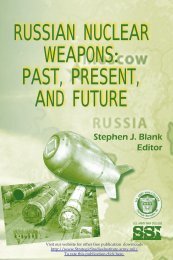The United States and China in Power Transition - Strategic Studies ...
The United States and China in Power Transition - Strategic Studies ...
The United States and China in Power Transition - Strategic Studies ...
Create successful ePaper yourself
Turn your PDF publications into a flip-book with our unique Google optimized e-Paper software.
In the post-Cold War era, the <strong>United</strong> <strong>States</strong> has become<br />
even more conv<strong>in</strong>ced that an <strong>in</strong>ternational order<br />
based on democracy, free commerce, <strong>and</strong> the rule of<br />
law is the only dest<strong>in</strong>y for the world. 28 Promotion of<br />
this <strong>in</strong>ternational order has been the central tenet of<br />
U.S. national strategy accord<strong>in</strong>gly. 29 <strong>The</strong> <strong>United</strong> <strong>States</strong><br />
is will<strong>in</strong>g to shed national treasure <strong>and</strong> blood to promote<br />
democracy abroad, as <strong>in</strong> the case of Iraq. <strong>Ch<strong>in</strong>a</strong><br />
unfortunately st<strong>and</strong>s as the s<strong>in</strong>gle largest roadblock<br />
<strong>in</strong> this U.S. mission (the Muslim world collectively is<br />
another). Thus on every occasion of <strong>in</strong>ternational importance,<br />
the <strong>United</strong> <strong>States</strong> challenges <strong>Ch<strong>in</strong>a</strong> to take<br />
on political reform <strong>and</strong> rem<strong>in</strong>ds <strong>Ch<strong>in</strong>a</strong> that without<br />
complet<strong>in</strong>g the long-dodged political modernization,<br />
<strong>Ch<strong>in</strong>a</strong> will not be able to reach its full potential, nor<br />
will it be able to act as a responsible stakeholder to<br />
promote common good <strong>in</strong> <strong>in</strong>ternational affairs. 30<br />
<strong>Ch<strong>in</strong>a</strong>, however, holds a different view. Ch<strong>in</strong>ese<br />
leaders argue that democracy is not the panacea for<br />
<strong>in</strong>ternational problems. 31 <strong>The</strong>y <strong>in</strong>sist that develop<strong>in</strong>g<br />
nations, <strong>Ch<strong>in</strong>a</strong> <strong>in</strong> particular, have authoritarian<br />
governments for good reasons—Hunt<strong>in</strong>gton’s classic<br />
argument for authoritarian stability <strong>in</strong> develop<strong>in</strong>g societies<br />
still st<strong>and</strong>s as a valid one. 32 U.S. heavy-h<strong>and</strong>ed<br />
pressure for forceful <strong>and</strong> hasty political change only<br />
creates political <strong>in</strong>stability <strong>in</strong> develop<strong>in</strong>g nations; <strong>in</strong><br />
the post-Cold War world, it is the U.S. hegemonic approach<br />
that is responsible for most of the <strong>in</strong>ternational<br />
conflicts <strong>and</strong> questionable armed <strong>in</strong>terventions. <strong>The</strong><br />
<strong>United</strong> <strong>States</strong>, as the Ch<strong>in</strong>ese argue, has been an “irresponsible<br />
stakeholder” <strong>in</strong> world affairs. 33<br />
Oppos<strong>in</strong>g hegemony has been an endur<strong>in</strong>g theme<br />
<strong>in</strong> Ch<strong>in</strong>ese foreign policy s<strong>in</strong>ce the early days of the<br />
People’s Republic of <strong>Ch<strong>in</strong>a</strong> (PRC) (the <strong>United</strong> <strong>States</strong><br />
has been the primary target of this policy; <strong>Ch<strong>in</strong>a</strong> also<br />
88

















